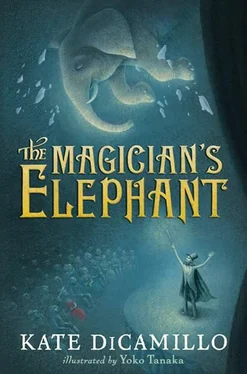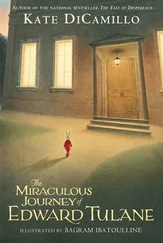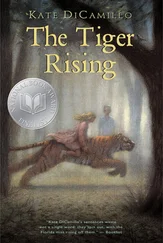The people of the city of Baltese became obsessed with the elephant.
In the market square and in the ballrooms, in the stables and in the gaming houses, in the churches and in the squares, it was “the elephant,” “the elephant that came through the roof,” “the elephant conjured by the magician,” “the elephant that crippled the noblewoman”.
The bakers of the city concocted a flat, oversized pastry and filled it with cream and sprinkled it with cinnamon and sugar and called the confection an elephant ear, and the people could not get enough of it.
The street vendors sold, for exorbitant prices, chunks of plaster that had fallen onto the stage when the elephant made her dramatic appearance. “Cataclysm!” the vendors shouted. “Mayhem! Possess the plaster of disaster!”
The puppet shows in the public gardens featured elephants that came crashing onto the stage, crushing the other puppets beneath them, making the young children laugh and clap in delight and recognition.
From the pulpits of the churches the preachers spoke about divine intervention, the surprises of fate, the wages of sin, and the dire consequences of magic gone afoul.
The elephant’s dramatic and unexpected appearance changed the way the people of the city of Baltese spoke. If, for instance, a person was deeply surprised or moved, he or she would say, “I was, you understand, in the presence of the elephant.”
As for the fortunetellers of the city, they were kept particularly busy. They gazed into their teacups and crystal balls. They read the palms of thousands of hands. They studied their cards and cleared their throats and predicted that amazing things were yet to come. If elephants could arrive without warning, then a dramatic shift had certainly occurred in the universe. The stars were aligning themselves for something even more spectacular; rest assured, rest assured.
Meanwhile, in the dance halls and in the ballrooms, the men and the women of the city, the low and the high, danced the same dance: a swaying, lumbering two-step called, of course, the Elephant.
Everywhere, always, it was “the elephant, the elephant, the magician’s elephant”.
* * *
“It is absolutely ruining the social season,” said the Countess Quintet to her husband. “It is all people will speak of. Why, it is as bad as a war. Actually, it is worse. At least with a war, there are well-dressed heroes capable of making interesting conversation. But what do we have here? Nothing, nothing but a smelly, loathsome beast, and yet people will insist on speaking of nothing else. I truly feel, I am quite certain, I am absolutely convinced, that I will lose my mind if I hear the word elephant one more time.
“Elephant,” muttered the count.
“What did you say?” said the countess. She whirled around and stared at her husband.
“Nothing,” said the count.
“Something must be done,” said the countess.
“Indeed,” said Count Quintet, “and who will do it?”
“I beg your pardon?”
The count cleared his throat. “I only wanted to say, my dear, that you must admit that what occurred was indeed truly extraordinary.”
“Why must I admit it? What was extraordinary about it?”
The countess had not been present at the opera house that fateful evening, and so she had missed the cataclysmic event; and the countess was the kind of person who hated, most horribly, to miss cataclysmic events.
“Well, you see—” began Count Quintet.
“I do not see,” said the countess. “And you will not make me see.”
“Yes,” said her husband, “I suppose that much is true.”
Unlike his wife, the count had been in attendance at the opera house that night. He had been seated so close to the stage that he had felt the rush of displaced air that presaged the elephant’s appearance.
“There must be a way to wrest control of the situation,” said the Countess Quintet. She paced back and forth. “There must be some way to regain the social season.”
The count closed his eyes. He felt again the breeze of the elephant’s arrival. The whole thing had happened in an instant, but it had also occurred so slowly. He, who never cried, had cried that night, because it was as if the elephant had spoken to him and said, “Things are not at all what they seem to be; oh no, not at all.”
To be in the presence of such a thing, to feel such a feeling!
Count Quintet opened his eyes.
“My dear,” he said, “I have the solution.”
“You do?” said the countess.
“Yes.”
“And what, exactly, would the solution be?”
“If everyone speaks of nothing but the elephant, and if you desire to be the centre, the heart, of the social season, then you must be the one with the thing that everyone speaks of.”
“But what can you mean?” said the countess. Her lower lip quivered. “Whatever can you mean?”
“What I mean, my dear, is that you must bring the magician’s elephant here.”
When the countess demanded of the universe that it move in a certain way, the universe, trembling and eager to please, did as she bade it do.
And so, in the matter of the elephant and the countess, this is how it happened – this is how it unfolded. There was not, at her home, as lavish and well appointed a home as it was, a door large enough for an elephant to walk through. The Countess Quintet hired a dozen craftsmen. The men worked around the clock, and within a day a wall had been knocked down and an enormous, brightly painted, handsomely decorated door installed.
The elephant was summoned and arrived under cover of night, escorted by the chief of police, who ushered her through the door that had been constructed expressly for her; then, relieved beyond all measure to have done with the affair, he tipped his hat to the countess and left.
The door was closed and locked behind him, and the elephant became the property of the Countess Quintet, who had paid the owner of the opera house money sufficient to repair and retile the whole of his roof a dozen times over.
The elephant belonged entirely to the Countess Quintet, who had written to Madam LaVaughn and expressed at great length and with the utmost eloquence her sorrow over the unspeakable and inexplicable tragedy that had befallen the noblewoman; she offered Madam LaVaughn her full and enthusiastic support in the further prosecution and punishment of the magician.

The fate of the elephant rested absolutely in the hands of the Countess Quintet, who had made a very generous contribution indeed to the policemen’s fund.
The elephant, you will now understand, belonged lock, stock and barrel to the countess.
The beast was installed in the ballroom, and the ladies and gentlemen, dukes and duchesses, princes and princesses, and counts and countesses flocked to her.
They gathered around her.
The elephant became, quite literally, the centre of the social season.
Peter dreamed.
Vilna Lutz was ahead of him in a field, and he, Peter, was running to catch up.
“Hurry!” shouted Vilna Lutz. “You must run like a soldier.”
The field was a field of wheat, and as Peter ran, the wheat grew taller and taller, and soon it was so tall that Vilna Lutz disappeared entirely from view and Peter could only hear his voice shouting, “Hurry, hurry! Run like a man; run like a soldier!”
“It is no good,” said Peter. “No good at all. I have lost him. I will never catch him, and it is pointless to run.”
Читать дальше













